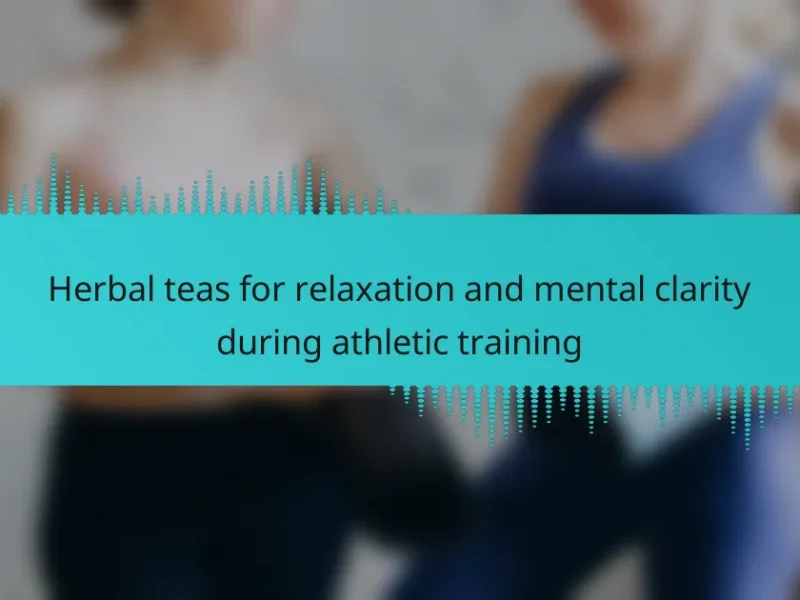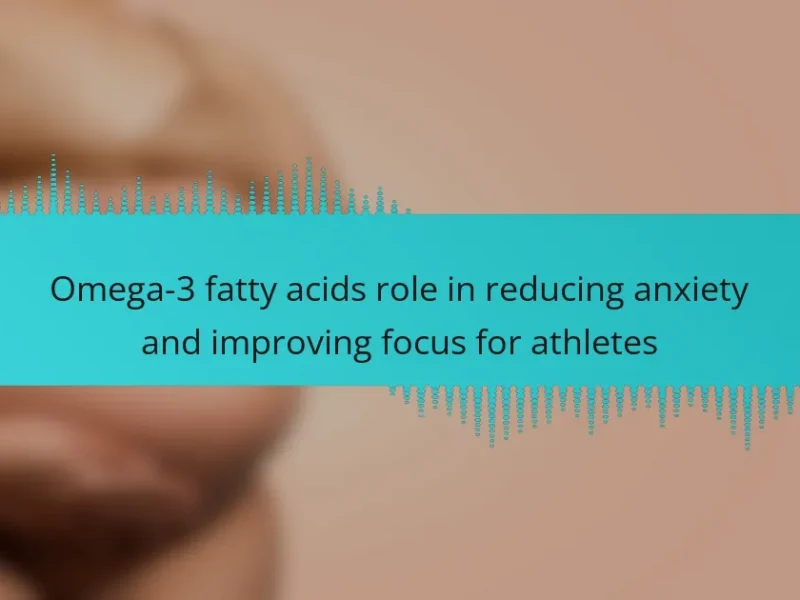Probiotics significantly enhance gut health and mental wellbeing for competitive athletes. They improve digestion, nutrient absorption, and immune function, while also reducing gastrointestinal discomfort and inflammation. Specific strains like Lactobacillus and Bifidobacterium can alleviate anxiety and stress, promoting focus during competitions. Incorporating probiotics into an athlete’s diet supports recovery and overall performance.

How do probiotics influence gut health for competitive athletes?
Probiotics significantly enhance gut health and mental wellbeing for competitive athletes. They improve digestion, nutrient absorption, and immune function, which are crucial for athletic performance. Research indicates that probiotics can reduce gastrointestinal discomfort and inflammation, allowing athletes to train more effectively. Additionally, a balanced gut microbiome positively influences mood and cognitive function, supporting mental resilience during competitions.
What are the key benefits of probiotics for gut health?
Probiotics significantly enhance gut health, which in turn benefits mental wellbeing in competitive athletes. They improve digestion, boost nutrient absorption, and support immune function. Research indicates that a healthy gut microbiome can positively influence mood and cognitive function, essential for athletic performance. Additionally, probiotics may reduce inflammation and stress, contributing to overall mental resilience during competitions.
How do probiotics affect digestion and nutrient absorption?
Probiotics enhance digestion and nutrient absorption by balancing gut microbiota and improving gut barrier function. This leads to increased bioavailability of nutrients and supports overall gut health, which is crucial for competitive athletes. Research indicates that specific strains of probiotics can reduce gastrointestinal discomfort and enhance recovery post-exercise. Moreover, a healthy gut microbiome positively influences mental wellbeing, contributing to improved performance and focus during competitions.
What types of probiotics are most effective for athletes?
Certain probiotics, such as Lactobacillus and Bifidobacterium strains, are particularly effective for athletes. These probiotics enhance gut health, improve nutrient absorption, and support mental wellbeing. Research indicates that Lactobacillus rhamnosus can reduce exercise-induced stress, while Bifidobacterium longum may enhance mood and cognitive function. Regular intake of these probiotics can lead to better performance and recovery for competitive athletes.

What unique mental wellbeing benefits do probiotics offer to athletes?
Probiotics offer unique mental wellbeing benefits to athletes by enhancing gut health, which is linked to mood regulation. Improved gut microbiota can reduce anxiety and stress levels, fostering better focus during competitions. Studies indicate that specific strains like Lactobacillus and Bifidobacterium may help alleviate symptoms of depression, promoting overall mental resilience. Additionally, probiotics can improve sleep quality, which is crucial for athletic performance and recovery.
How can probiotics impact mood and cognitive function?
Probiotics can enhance mood and cognitive function by promoting gut health, which is crucial for mental wellbeing in competitive athletes. Research indicates that a balanced gut microbiome supports neurotransmitter production, impacting mood regulation. For instance, probiotics can increase levels of serotonin, a key neurotransmitter linked to happiness and cognitive performance. Additionally, athletes with improved gut health may experience reduced anxiety and better focus during competitions, leading to enhanced overall performance.
What role do probiotics play in stress management for athletes?
Probiotics significantly enhance stress management for athletes by promoting gut health, which is linked to mental wellbeing. A balanced gut microbiome can reduce anxiety and improve mood, crucial for competitive performance. Research indicates that specific strains, like Lactobacillus and Bifidobacterium, may lower cortisol levels, the stress hormone. Regular intake of probiotics may support athletes in coping with the psychological demands of competition, leading to improved focus and resilience.

What rare attributes of probiotics can enhance athletic performance?
Rare attributes of probiotics can significantly enhance athletic performance by improving recovery and reducing inflammation. Specific strains, like Lactobacillus rhamnosus, may enhance endurance and reduce fatigue. Additionally, the production of short-chain fatty acids by certain probiotics can provide energy during prolonged exercise. These unique attributes contribute to better gut health, which is crucial for nutrient absorption and overall mental wellbeing in competitive athletes.
How do specific probiotic strains support recovery and endurance?
Specific probiotic strains enhance recovery and endurance by improving gut health and mental wellbeing. Strains like Lactobacillus rhamnosus have shown to reduce inflammation, which accelerates muscle recovery. Additionally, probiotics can enhance nutrient absorption, providing athletes with essential energy for endurance activities. Research indicates that gut microbiota balance positively influences mood and cognitive function, crucial for competitive performance.
What are the lesser-known effects of probiotics on inflammation?
Probiotics may reduce inflammation through various mechanisms, including modulation of gut microbiota and immune response. These effects can enhance recovery and performance in competitive athletes. Research shows specific strains like Lactobacillus and Bifidobacterium can lower inflammatory markers, promoting better gut health and mental wellbeing. Furthermore, probiotics can influence the gut-brain axis, potentially reducing stress and anxiety, which are common in high-performance environments.

What are the best practices for incorporating probiotics into an athlete’s diet?
Incorporating probiotics into an athlete’s diet enhances gut health and mental wellbeing. Focus on diverse probiotic sources such as yogurt, kefir, and fermented vegetables. Consuming these foods regularly supports a balanced microbiome, which can improve nutrient absorption and reduce inflammation.
Timing is crucial; athletes should consider taking probiotics post-workout to aid recovery. Research indicates that a daily intake of at least 1 billion CFUs (colony-forming units) can optimize benefits. Additionally, combining probiotics with prebiotics, found in foods like bananas and oats, can further enhance gut health.
Monitoring individual responses to different probiotic strains is essential, as unique attributes may affect efficacy. Athletes should consult with nutritionists to tailor their probiotic intake based on personal health goals and dietary preferences.
How can athletes choose the right probiotic supplements?
Athletes can choose the right probiotic supplements by considering specific strains that support gut health and mental wellbeing. Look for probiotics with Lactobacillus and Bifidobacterium strains, as they are known to enhance digestion and reduce anxiety. Check CFU counts; higher counts often indicate more effective products. Additionally, select supplements with prebiotics for better efficacy. Lastly, assess individual health needs and consult a healthcare professional for personalized recommendations.
What dietary sources of probiotics should athletes consider?
Athletes should consider yogurt, kefir, sauerkraut, kimchi, and kombucha as dietary sources of probiotics. These foods enhance gut health and mental wellbeing, supporting overall athletic performance. Yogurt contains beneficial strains like Lactobacillus and Bifidobacterium, while kefir offers a wider variety of probiotics. Fermented vegetables like sauerkraut and kimchi provide fiber and nutrients alongside probiotics. Kombucha, a fermented tea, can also contribute to gut health. Regular intake of these sources may improve digestion and mental clarity, crucial for competitive athletes.
What common mistakes should athletes avoid when using probiotics?
Athletes should avoid several common mistakes when using probiotics. First, they often neglect to choose the right strain for their specific needs, which can diminish effectiveness. Second, improper timing of intake can lead to suboptimal gut health benefits. Third, athletes may overlook the importance of consistency; sporadic use can hinder results. Lastly, they might not consider dietary factors that can impact probiotic efficacy, such as high sugar intake or antibiotic use, which can disrupt gut flora balance.
How can athletes optimize their gut health for better performance?
Athletes can enhance gut health and performance by incorporating probiotics into their diet. Probiotics improve gut microbiota balance, which can lead to better nutrient absorption and reduced inflammation. Studies show that athletes using probiotics experience improved mental wellbeing, contributing to enhanced focus and resilience during competition. Regular intake of probiotics can also support immune function, helping athletes stay healthy and perform consistently.


